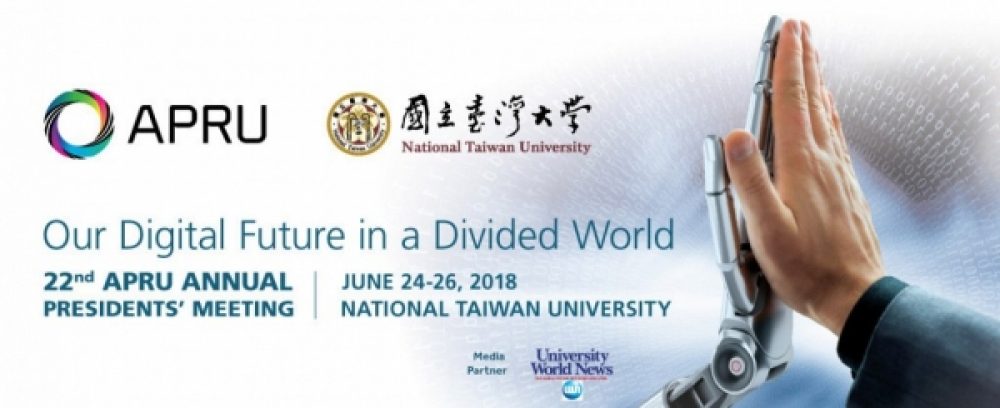Yonjana Sharma 15 June 2018 Issue No: 510
Over a hundred delegates, including 30 university presidents, will attend the Association of Pacific Rim Universities (APRU) conference entitled ‘Our digital future in a divided world’, being held at the National Taiwan University in Taipei, “to consider the fundamental pressures on university leadership in terms of the major themes affecting higher education and research. The digital future is one, and the inequality in the world is another”, says Christopher Tremewan, APRU secretary general.
“We’re not just talking about the digital divide, but a world divided socio-economically and in international relations.”
APRU – a grouping of some 50 university heads of some of the most prestigious universities in Asia, the Pacific and the Pacific-facing Americas, including Mexico, the western United States and Canada, particularly the province of British Columbia – is a part of a region that is “at the leading edge of digital technology in terms of innovation, of the emergence of giant tech corporations and of market growth in applications that bring together big data and information and communications technology,” Tremewan notes.
“In this fast-evolving landscape of artificial intelligence and data science we are aware of the opportunities to bring benefits to our societies and, also, that we have the responsibility to understand and mitigate the risks of powerful new technologies.”
“Our members constitute a large proportion of the research and innovation capabilities of the APEC [Asia-Pacific Economic Cooperation] economies. As institutions and as a network we have a responsibility to direct that capability in socially responsible ways, as well as offering ethical leadership.”
Geopolitical changes
APRU, he says, is committed to collaboration and multilateralism, despite the turn towards nationalism, for example under President Donald Trump in the United States and in the United Kingdom with Brexit.
Against this backdrop, universities need to build public trust and long-term relationships. “Academics have always done this, but now the environment for collaboration is more complex,” he says.
Geopolitically, “global tensions are heightening, the rivalries are deepening and the role of the research community and the education community is to maintain trust and build links regardless of these pressures and tensions between nation states,” he says.
With inequality, climate change, sustainability, ageing populations and global health still major global challenges to resolve, “some of these geopolitical pressures are making it harder for us to collaborate on global challenges, but in the interests of all our societies we have overcome these funding and geopolitical pressures and ramped up our collaboration.”
“Another aspect of higher education geopolitics is that funding of university research seems to be increasingly directed by funding bodies on the basis of short-term national interests, and that’s not just China, it’s everywhere,” he notes.
Yet the enormous growth of open research collaboration in the past three decades has led to a global research system that is “surprisingly open in the sense that many of the major research countries – but not only the major research countries – are players, but also practically everybody has come in on it,” Tremewan says, adding that “it’s producing quality science and not necessarily controlled by the agendas of each nation state”.
APRU as a network is able to tap into this open global research system for far greater outcomes than the group ever thought they would obtain, he said, in part because the spectacular development of an open global research network over past decades “happened largely behind the scenes”.
“It’s a historical moment for the APRU network, which has become a seamless network of world-class universities, and our particular network is focused on the geopolitics of the Asia-Pacific region, which is one of the most dynamic regions of the world.”
Higher education geopolitics – the shifting balance
The shifting balance of power in the geopolitics of higher education, which Tremewan sees as “a subset of broader geopolitics”, includes the way talent moves around the globe. “The attraction of the best minds both of student and faculty members is a kind of geopolitics, too,” he says.
This has been heightened by the global competition for top researchers in artificial intelligence, robotics, nanotechnology, genetics and other high technology fields.
“An aspect of the geopolitics of higher education is the mobility of scholars and students and the influence on national foreign policies and attitudes to foreigners, refugees and immigrants. It is beginning to have an impact on where people feel welcome,” Tremewan says.
“For research universities there is a lot at stake – whether or not we can recruit the best PhD students and the like.”
He notes that the “research race” appears to be skewing the behaviour of many universities. So one of the benefits of the Taipei meeting is for university presidents to “discuss common challenges and examine trends in public policy and technology that are going to impact on universities if they haven’t already; and exchange experiences on how to deal with these challenges, so that they can be better prepared in their own country”.
“Multilateralism, leveraging networks and contributing to a global common good are the things that drive us as a network that can produce positive outcomes as a kind of super connector across this region,” he says.
University World News is a media partner for the APRU meeting.

